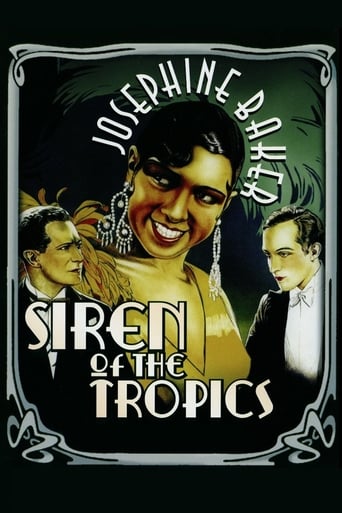

During the 20's, the Weimar nights were fabulous, full of exciting and decadent cabarets in which this German count spent many glorious soirées but it is fair to say that also in Paris, the Parisians knew how to have fun.Dame Josephine Baker, Amerikan from birth, French by adoption, was the indisputable queen, a legend of the Parisian nights during the 20's, an enormous singer and entertainer that did delight the French bourgeoisie during the past century.Dame Josephine Baker had a short film career, appearing from time to time in some films and, as it happens, in "La Revue Des Revues" recently reviewed by this German count. "La Sirène Des Tropiques, a film directed hand-in-hand by Herr Mario Nalpas and Herr Henri Étiévant, was her first full-length film as leading actress.The most important aspect of "La Sirène Des Tropiques" is that it is a film with Dame Baker and this is the perfect excuse to watch this film. For Dame Baker fans or for ignorant longhaired youngsters who still don't know her, that's the most attractive aspect of the work because, in artists terms, the film it is an absolute failure.The plot's topic about the tropics; engineer Berval ( Herr Pierre Batcheff ) is sent to Monte Puebla by his boss the Count Severo ( Herr Georges Melchior ) in order to study the possibilities of mineral extraction from the mines that belongs to his chief. But the wicked Count ( a classical reiteration ) inner intentions is that Berval never return to France. In this way he doesn't have any obstacle in order to get Denise's love ( Dame Regina Thomas ). Meanwhile in Monte Puebla, Berval will meet Papitou ( Josephine Baker ) who is a sparkling indigene that will fall in love with him. She doesn't hesitate to pursue Berval to Paris where finally she will find out that he loves Denise but on the other hand she will become a music-hall star. The film is full of intrigues and satires (but this is too formulaic and with simple characters ). The result is an unwise mixture of genres in one film ( adventure, drama, musical, ) with plenty of bad performances including Dame Baker. This in spite of the fact that she plays a kind of free spirited girl, but similar to a cartoon character, a "pecata minuta" in itself. Our heroine was more interested to dance the Charleston than properly act. This is demonstrated at the end of the film, which includes an excerpt of her talented dancing. That's enough for Dame Baker fans and dissipated German aristocrats.And now if you'll allow me, I must temporarily take my leave because this German count must unknot his knees before dancing Charleston.
... View MoreAlthough it came very early in her film acting career, this is well worth seeing for the performance by Josephine Baker. Her talent more than makes up for any lack of experience, and the role gives her a lot to work with. Although there is no singing, her dancing, athleticism, boundless energy, and personal allure all stand out. The rest of the movie is solid rather than impressive, but most of it works all right in itself.Baker plays Papitou, an innocent, loyal native girl who becomes part of a clash involving a soulless French nobleman, his brutal colonial henchman, and a young engineer hoping to succeed in the tropics so that he can marry his Parisian fiancée. The first half shows the conflict that plays out in the tropics, and the second half shows the characters back in Paris, with the different settings naturally leading to much different kinds of developments.Baker's role has many similarities to her roles in later movies such as "Princesse Tam Tam" and "Zou Zou". As her first such role, she not only looks quite young, but also seems to have an extra freshness here. The character also is put in very different circumstances in the different parts of the story. From that viewpoint, the first half is more enjoyable, since it shows Papitou in her element. In the second half of the movie, her character is treated rather thanklessly, and at times it is almost painful seeing such an appealing character treated so badly by the story and by the other characters - which indicates how believably Baker defines her character.
... View MoreSome spoilersThis is now available more or less in full on a Kino DVD. Baker's first film (though it's silent, making do with occasional intertitles); it doesn't quite know what to do with her. She becomes sort of second banana in her own film, much as the Marx Brothers occasionally were - doing their stuff, but secondary to the conventional love stories. She performs her vigorous, loose-limbed dancing in several scenes, in close up and long-shot, and even in silence she has undeniable star quality. She's seen as a child of nature, passionate, honest, comic (there's a long slapstick chase on a steamer when she's alternately black, from hiding in a coal bin, and white, from hiding in flour) and finally self-denying as she leaves the hero she adores to marry his fiancée, kills his scheming rival (where did she learn to handle a gun like that?) dances once more while smiling through her tears, then leaves for the USA. Still, the movie respects her talents; she appears near-naked a couple of times but it's not leering or exploitative; her colour is never an issue; and she gets to do her dances. She's still great.
... View MoreI only saw the first and last two reels, supposedly all of the file that has survived. Josephine Baker's role is similar to her roles in Zouzou (1934) and Princess Tam-Tam (1935), the innocent from the tropics who is brought to civilization and finds it somewhat wanting. However, she does get to keep a man in the end.Most interesting for Josephine Baker. It includes a short segment of one of her stage dances. Seeing her move in close-up is also a pleasure. The film is an oddity in that it was shot as a pantomime (there are no titles).
... View More